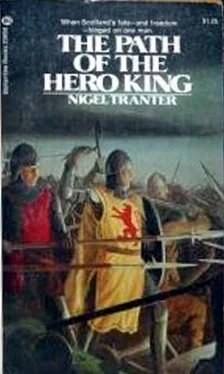This was a shrewd blow at Angus himself, for the Earl of Ross was in fact the Lord of the Isles rival for almost complete hegemony in the North. But the younger man did not rise to the fly, apparently content to tackle one project at a time. He stood by his promise, however, and allotted the King and his party a twenty-six-oar galley under the command of one MacDonald of Kiloran, and wished them well. If the Bruce was still in his territories when he got back from the Irish expedition, they would forgather again.
On the 20th of September, therefore, one of the great fleet of galleys turned its back on Rathlin Island and the Ulster coast, and set off northwards into the Sea of the Hebrides. It was significant, however, that the banner which flew at its masthead, like that painted on the great square sail, was the black Galley of the Isles, not the red Lion Rampant of Scotland.
Chapter Four
The slanting golden afternoon sun of early October, playing on the isle-dotted, skerry-strewn sea, brought out a depth of colour, of light and shade, of sheer breathtaking beauty, such as Bruce, for one had never before contemplated. In the weeks that he had spent in the Isles, beauty had become commonplace, part of his life. But this of the level rich autumn sun in its flooding of the Sound of Eigg, was beyond all telling. The sea, blue and green and amethyst, picked out with the sparkling white of breakers on the multi-hued, weed-hung skerries, was no more than a setting for the jewelled islands that rose in aching loveliness all around, the turning heather of their flanks stained crimson, their cliffs slashed with violet shadows, their cockleshell sands dazzling silver against the refulgent gold. Without ever having been greatly concerned with natural beauty, the Kings trials, disappointments and sorrows had made him receptive to many influences which once he would have failed to perceive. And beauty such as this might put even his troubles into perspective.
But shouts came from near by, as he leaned on the poop rail in contemplation. They were sailing northwards towards the majestic purple peaks of the Isle of Rhum, with Eigg and Muck on their starboard bow, so that he had been gazing half-right. But others had been looking in the opposite direction, half-astern to port, into the dazzle of the westering sun. And now MacDonald of Kiloran, up in the bows and shading his eyes into the golden glare, was calling back to the helmsman, near whom the King, Douglas and Lennox stood. His shouts were in the Gaelic, but the pointing hand drew all eyes.
In all the glitter and eye-hurting brilliance of the westerly prospect, it was difficult at first to discern anything to account for the shouting. But presently, with many gesticulating, it became evident that there were solid shapes amongst all that dazzlement, even though these themselves seemed to be gleaming.
Kiloran came longstrided down the narrow catwalk between the rowers.
Three galleys, two and one, he informed.
And, if I mistake not, the two fly the red and gold of Ross.
Ross? Bruce echoed.
And that concerns you?
When they chase a birl inn flying the Galley of the Isles-yes!
the other replied shortly. Then he was shouting again to the rowers
and helmsman. Immediately that galley was transformed.. From
voyaging quietly northwards on its colour-stained way from Coll to Lochalsh in the narrows of Skye, with the oarsmen pulling almost idly at their long sweeps, to the gentle chanting of a haunting melody, it became of a sudden a ship of war again, braced, tense, determined.
Round in a great foaming half-circle it swung, the sail-boom creaking, the canvas shivering and flapping, the rowers straining fiercely, the blades churning the blue water white.
Kiloran soon was seen to be steering an intercepting course. The relief crew of oarsmen were as obviously arming themselves.
What do you intend? Bruce asked of the MacDonald.
To teach Ross whose seas these are.
The other might have pointed out that, since this was still Scotland, these were the Kings seas. Also that Angus Og had lent him this galley for his purposes, not for challenging all corners. A few months ago he would undoubtedly have said so. But Robert Bruce had been learning in a hard school. He held his peace.
His eyes were now able to cope with the glare and glister, and he could make out, perhaps two miles away, the three craft, the two larger most evidently pursuing the smaller, and overhauling it fast They were heading in an almost due easterly direction, towards the mainland, just north of the great peninsula of Ardnamurchan. How Kiloran could declare that they bore this colour or that device, Bruce did not know.
What quickly became clear, as they themselves swept across the sea at a speed unprecedented as far as the Lowlanders were concerned, was that the hunters, from the earldom of Ross or elsewhere, were not going to be diverted by the intervention of a third party; and also that they would have closed with their quarry before the would-be rescuers could reach the scene, fast as the latter were moving.
It is another of your lords galleys? Angus Ogs? Bruce asked, of Kiloran.
The Earls ships are far south, are they not? I would not have thought they would have dared such piracy against the Lord of the Isles.
Not one of Anguss, no. See you, there is a fish below the Galley.
On sail and banner. That is for Garmoran. MacRuarie. Christina, of Garmoran. But of our Isles federation. Of the kin of Somerled.
The Rossmen would scarce have dared attack one of Angus of Islays own.
So we go teach them!
They were still almost a mile away when they distinctly heard, across the water, the crash and clash and yells as contact was made, and the two larger vessels bore in close on either side of the smaller, shearing off oars and skewering oarsmen in bloody chaos. Grappling-irons thrown in to hold the three craft together, men poured ayes into the birl inn from port and starboard, drawn swords flashing in the sun.
The rowers in the Kings galley were now driving their sweeps in what almost amounted to a frenzy, the chanting, not to waste precious breath, superseded by the beating of time by sword on shield, in a rhythmic clanging which grew ever faster, punctuated by a sort of barking cough which was indrawn gasping breathing of fifty-two oarsmen curiously savage and menacing sound. The galley tore on in a cloud of spray.
Now, with the other vessels almost stationary, they overhauled them at speed. The devices on the flapping sails were clear-the black galley above a long black fish; and three red lions on gold.
You intend to attack? Bruce demanded.
What else? I shall run in at the stern.
You will be outnumbered. These are larger galleys than yours.
What of it? Do you count heads, Sir King, before you draw your sword?
I do-if I may, yes!
So does not fight MacDonald! Bide you and yours in safety here, then, Leave this to MacDonald.
I mink you mistake me, sir, the King said quietly.
They drove in towards the stems of the three ships. Hand-to hand fighting was in progress in the well and after-parts of the birl inn bodies dropping or being tossed over the side all around.
What do we do, Sire? Sir James Douglas demanded.
Join in? Or hold back?
This is no quarrel of ours, Lennox said.
It is foolhardy …
Perhaps. But these MacDonalds are our hosts, Bruce pointed out.
We live on their bounty. Let every man make his own choice.
I, for my part, will pay the debts of hospitality.
Sire-is it wise? Lennox persisted, low-voiced.
If these are the Earl of Rosss ships. Ross is one of your earls. A
Читать дальше












